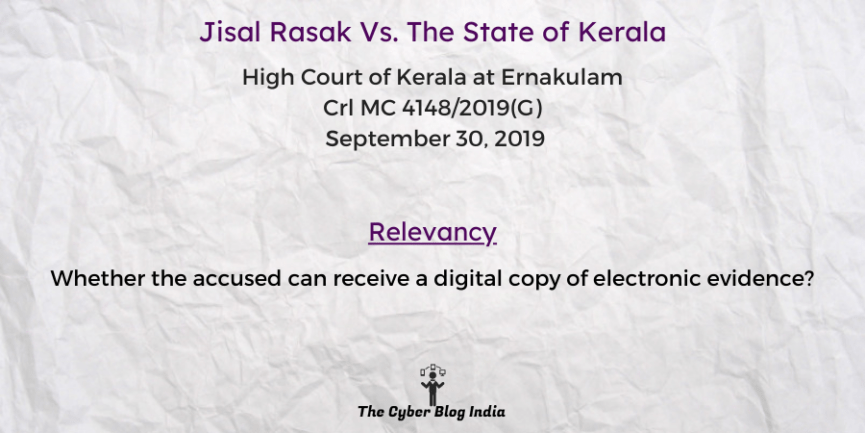Jisal Rasak v. The State of Kerala

Jisal Rasak Vs. The State of Kerala
2019 (4) KHC 928
In the High Court of Kerala at Ernakulam
Crl MC 4148/2019(G)
Before Justice Raja Vijayaraghavan V.
Decided on September 30, 2019
Relevancy of the case: Whether the accused can receive a digital copy of electronic evidence?
Statutes & Provisions Involved
- The Information Technology Act, 2000 (Section 2(t), Section-4)
- The Indian Evidence Act, 1872 (Section-3)
Relevant Facts of the Case
- The petitioner approached the learned Magistrate and filed an application seeking to obtain copies of the CCTV footage, the Forensic Science Laboratory report relating to the CCTV footage, and the investigating agency’s report seeking further investigation.
- The prosecution vehemently opposed the handing over of the CCTV footage and argued that the footage as a material object cannot be used to produce digital copies.
- The learned Magistrate ordered the issuance of the records but refused to issue digital copies of the camera footage. Aggrieved, the petitioner hence appealed the Magistrate’s decision.
Prominent Arguments by the Advocates
- The petitioner’s counsel submitted that the learned Magistrate egregiously erred in his conclusions. Per Section 3 of the Indian Evidence Act, 1872, “evidence” includes electronic records produced for the inspection of the Court. Hence, the document in question was evidence that the counsel could request accordingly.
- The learned Senior Public Prosecutor denied the petitioner’s submissions. Per Sherin V. John v. State of Kerala, he argued that the law recognises a third category of evidence in addition to oral evidence as well as documentary evidence, which is ‘real evidence’ or ‘physical evidence’.Moreover, it consists of material objects other than documents produced for the inspection of the Court. Thus, Section 207 of the CrPC does not cover the material evidence. Moreover, there is no law providing for the issuance of a copy of a material object.
- Furthermore, the counsel submitted that the electronic record, produced as a material object is a piece of real evidence and will not fall in the category of an electronic record or document. Hence, the accused does not require a copy of the same from the prosecution. The accused cannot clamour of prejudice and claim it as a matter of right.
Opinion of the bench
- The bench observed that per Section 4 of the Information Technology Act, electronic records have legal recognition.
- Furthermore, “Evidence” means and includes all witness statements the court permits or requires before itself. Under matters of fact under inquiry, such statements are oral evidence. On the other hand, all documents including electronic records produced for the inspection of the Court are documentary evidence. Only after the 17.10.2010 amendment, documentary evidence can include electronic records.
- The accused’s counsel can be given documentary evidence to provide the accused access to justice. Hence, the bench found that a digital copy of the footage could be made for the petitioner’s perusal of evidence.
Final Decision
- The bench thus, allowed the petition and directed the issue of the digital copies to the petitioner.
इस केस के सारांश को हिंदी में पढ़ने के लिए यहाँ क्लिक करें | To read this case summary in Hindi, click here.
